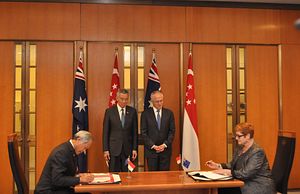Last week, Singapore and Australia signed a new agreement on cybersecurity in yet another sign of the growing concern by both countries as well as the region more generally about the growing challenge in this realm.
Singapore and Australia have both been intensifying efforts to combat a growing cybersecurity challenge in recent years. The Turnbull government launched its cybersecurity strategy last April, while Singapore has been ramping up its cyber capabilities amid growing attacks, including through the creation of a new cyber command called the Defense Cyber Organization (DCO). The city-state in particular has been looking to work with other partners to lead efforts within Southeast Asia to build up cyber capabilities among states (See: “Singapore Unveils New ASEAN Cyber Initiative”).
On June 2, at the second Singapore-Australia Leaders’ Summit, the two countries signed a new pact on cybersecurity. The agreement was signed by David Koh, the chief executive of Singapore’s Cybersecurity Agency, and Tobias Feakin, the ambassador for cyber affairs from Australia’s Department of Foreign Affairs and Trade. It was witnessed by visiting Australian Prime Minister Malcolm Turnbull and Singapore Prime Minister Lee Hsien Loong, who had both held the inaugural summit meeting last October following the elevation of their bilateral relationship to the level of a comprehensive strategic partnership in 2015 (See: “Australia and Singapore: What’s in a New Strategic Partnership?”).
The agreement covers cybersecurity cooperation in several areas, including regular information exchange on incidents and threats; the sharing of best practices to promote innovation; training in cybersecurity skill sets; joint exercises with a focus on the protection of critical information structure; and regional cyber capacity-building and confidence-building measures. Both countries will also work to promote responsible state behavior in cyberspace through various steps, beginning with an ASEAN cyber risk-reduction workshop that they will organize at the end of 2017.
In a statement released by CSA following the inking, Koh said that the MOU demonstrated both the shared vision the two countries had of cybersecurity as an enabler that supports innovation, growth, and social development, as well as their commitment to work together to build a secure and resilient cyberspace.
According to the CSA, this is the sixth such bilateral MOU that it is entering into since its establishment in April 2015 as the coordinating body overseeing national cybersecurity under the Prime Minister’s Office and with management from the Ministry of Communications and Information. Similar deals had been inked with France, India, the Netherlands, the United Kingdom, and the United States. The initial MOU will last for two years, after which it can be renewed.

































